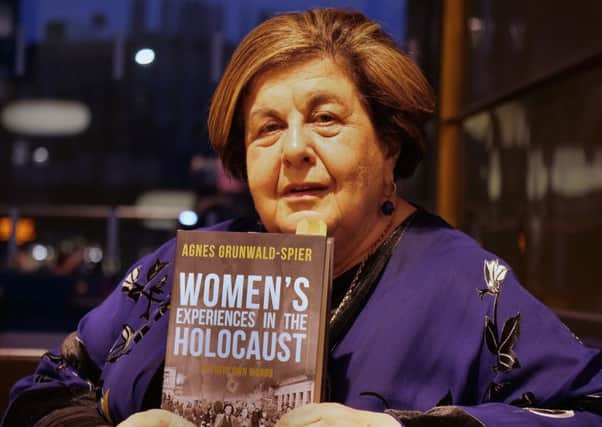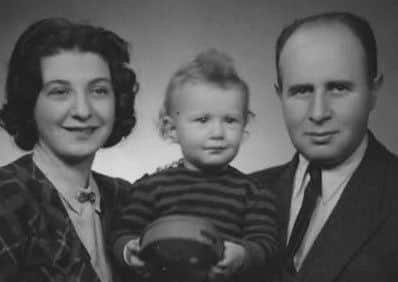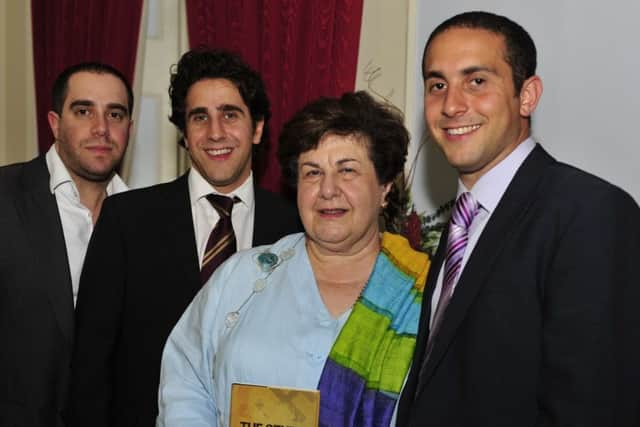'˜I survived the Holocaust as a baby - now I fight to ensure the terrible truth is never forgotten'


“There is nothing like knowing that someone wanted to kill you when you were a tiny baby to make you appreciate the joys of life.” Straight-talking Agnes Grunwald-Spier is a woman with an extraordinary life story of her own but the author has dedicated much of her time in recent years to researching and telling the accounts of other Jewish people who experienced The Holocaust.
It is only now in her third book, Women’s Experiences in the Holocaust, that she has started to touch on her own family’s experiences in Hungary in wartime - and how what happened to them haunted her father so much he took his own life when she was just ten.
Advertisement
Hide AdAdvertisement
Hide AdBorn in Hungary in July 1944, Agnes was a baby in the Budapest Ghetto. Her father Philipp had been rounded up for forced labour with 50,000 other Jewish men and taken to Poland to work on disposing mines and airfields.


More than 40,000 died but he managed to survive. He returned to Budapest in March 1945, two months after the city had been liberated by the Russians.
The family moved to England in 1947, but Philipp committed suicide in 1955, leaving Agnes’s mother Leona to provide for the family.
Raised in Surrey, Agnes went on to become a civil servant and a magistrate before her life changed while living in Sheffield in the 1990s and she became involved in bringing the Anne Frank Exhibition to the city. Feeling she needed to know more about the subject of the Holocaust following her mother’s death in 1991 so she could better explain it to her three sons, Agnes signed up for a new part-time masters’ degree in Holocaust Studies at the University of Sheffield.
Advertisement
Hide AdAdvertisement
Hide Ad“When I was in my 50s, I had three teenage sons who to all intents and purposes were just ordinary Englishmen. But of course, they are not because of my background,” she says.


“I didn’t really feel comfortable discussing the Holocaust with them because I didn’t feel I knew enough about it.”
Her dissertation was on the subject of the ‘rescuers’ - people who put their lives on the line to get Jews to safety from the Nazis.
It became the subject of her first book, The Other Schindlers, which was eventually published in 2010 and went on to sell more than 13,000 copies.
Advertisement
Hide AdAdvertisement
Hide Ad“Being a rescuer was a very dangerous thing to do. You were risking your own life and that of your family and children. Providing shelter to Jews was punishable by death.”


She says she was surprised and pleased with the book’s reception. “What is really nice is some of my friends say when they read my books that it is as though they can hear me saying it. I don’t write in an academic way, I write for ordinary readers.”
After missing the research, Agnes then went on to write a second book this time focusing on a very different element of the Holocaust - the people who betrayed their Jewish neighbours and colleagues, condemning them to death in many cases. She has now just published her third book, which tells the stories of women who went through the Holocaust in their own words.
Speaking to The Yorkshire Post ahead of a recent talk at the University of Sheffield, where she was recently granted an Honorary Doctorate, Agnes says many of the stories she uncovered stuck with it but she was especially touched by that of a woman called Leny Jacobs.
Advertisement
Hide AdAdvertisement
Hide AdJacobs, from Amsterdam, was split from her husband and her three children during the war and she died in Auschwitz in 1944, aged just 33. Two years earlier while pregnant, she had written a letter to a friend in which she explained how she believed “the Jews are to be eradicated” and weighed up whether it would be safest for her children if she parted with them so they could more easily go into hiding.


She said in the letter: “It is such foolishness to think that you will be the only one or one of the few who will not be eradicated. And yet you have to believe in that nonsense because it is the only way to keep one’s spirits up. The possibility of winning the race against the end of the war seems to become smaller by the day.”
Agnes says: “It is very hard to read it without wanting to cry because it is so incredibly poignant. She was a clever woman who trained as a doctor. She didn’t kid herself about what was going to happen, she had clarity of vision and was trying to make decisions in a nightmare situation. The women in the book aren’t like Joan of Arc. They are ordinary women who all wanted ordinary lives in a desperate situation.”
Agnes says one of her biggest motivations in writing the books is to ensure the terrible truth of what happened to people like Leny Jacobs is not lost.
Advertisement
Hide AdAdvertisement
Hide Ad“The Holocaust was such a terrible event and so many people try to negate it or diminish what happened. I just think it is terribly important the truth is recorded. I was born in the last year of the war and I am 73. I am one of the youngest Holocaust survivors.
“When you are researching or attending a memorial event, the enormity of it hits you again. Not only did six million people die but you also have to think of the generations that were never born afterwards. Of the six million, 1.5 million were children. They never grew up and had their own children.
“The other thing I think is really important is suicides after the war. Nobody really knows how many people committed suicide. I’m very interested in that because my father committed suicide ten years after the war.
“Even before the war, there are records of Jews who were losing their livelihoods in 1933 after Hitler came to power taking their lives as they couldn’t cope. If you ran a small business and lived above the shop, then you lost your home as well.”
Advertisement
Hide AdAdvertisement
Hide AdWhen she spoke to young graduates at the University of Sheffield last month as she received her Honorary Doctorate, Agnes says the lessons of the Holocaust remain pertinent to this day. “When I wrote about Holocaust Rescuers I realised that those that risked their lives to save Jews followed their instinct for what was right – not what the dictators told them,” she told the students.“Hopefully you will never have to deal with horrors on the scale of the Holocaust but you will have to decide to speak up at times – if someone makes a racist, anti-Semitic, homophobic comment in your presence. Doing nothing is not an option.
“Being published late in life surprises people. They see a dumpy old woman, assume I am retired and when I say I still work are surprised. When I say I’m a writer – one chap assumed it was cookery books. I said ‘I write about the Holocaust’ and added ‘I was a baby in the Budapest Ghetto’. That shut him up.”
She says her books ask an uncomfortable question of their readers. “Would you be a bystander or a rescuer? It is a big question to ask yourself.”
Terrible fate of Hungarian Jews
Almost three-quarters of Hungary’s Jewish population were killed in the Holocaust.
Advertisement
Hide AdAdvertisement
Hide AdHungary was a willing ally of Nazi Germany, adopting anti-semitic legislation and from 1941, sent 100,000 Jewish men - including Agnes’s father into forced labour.
In 1944, an estimated 440,000 Jews were forced into ghettos and 425,000 deported to Auschwitz-Birkenau, where most were killed in the gas chambers and others died from disease and starvation.
The World Holocaust Centre in Jerusalem recognises 823 Hungarian rescuers who helped save the lives of Jewish people during the Holocaust.
But despite their efforts, nearly 600,000 Hungarian Jews were murdered out of a population of over 800,000.